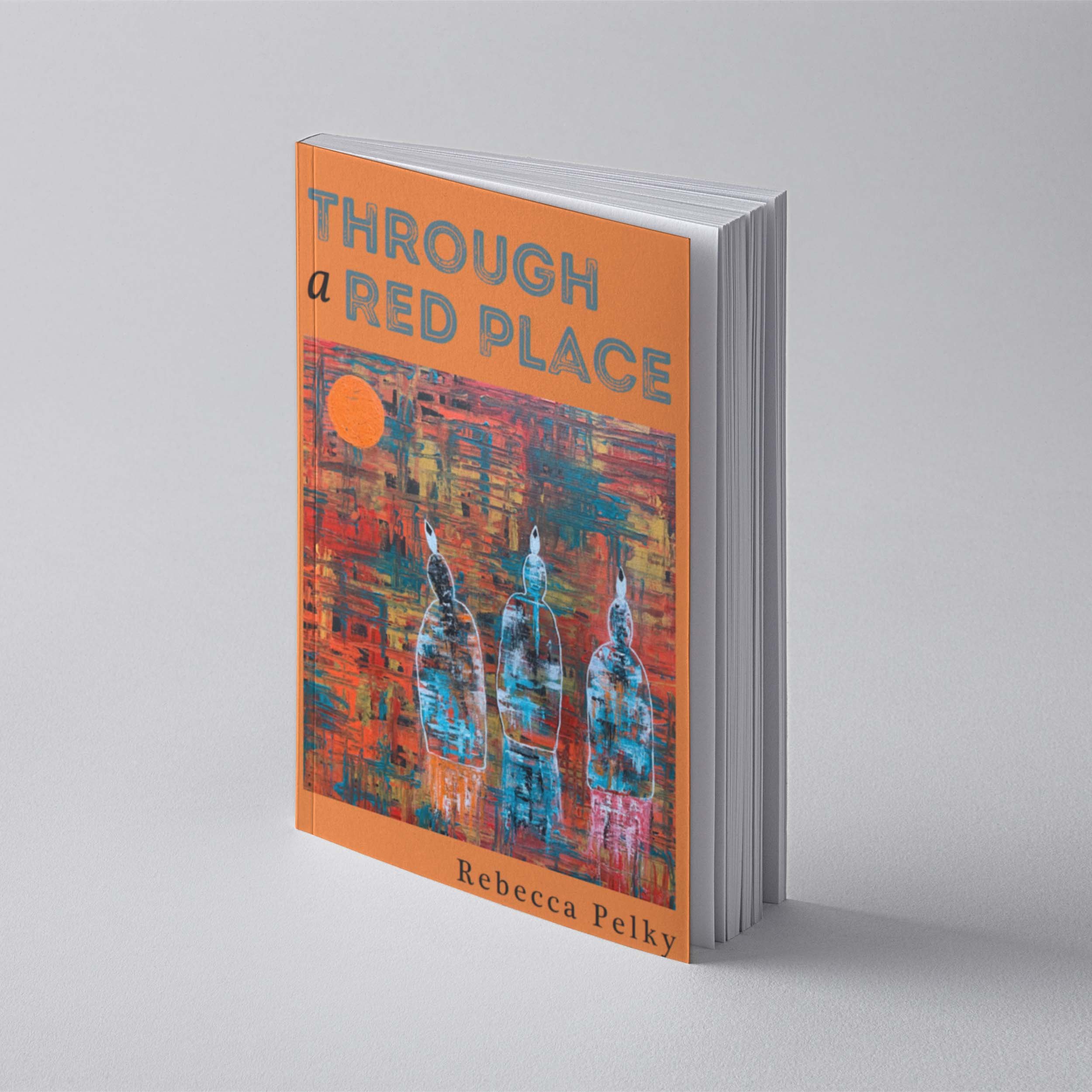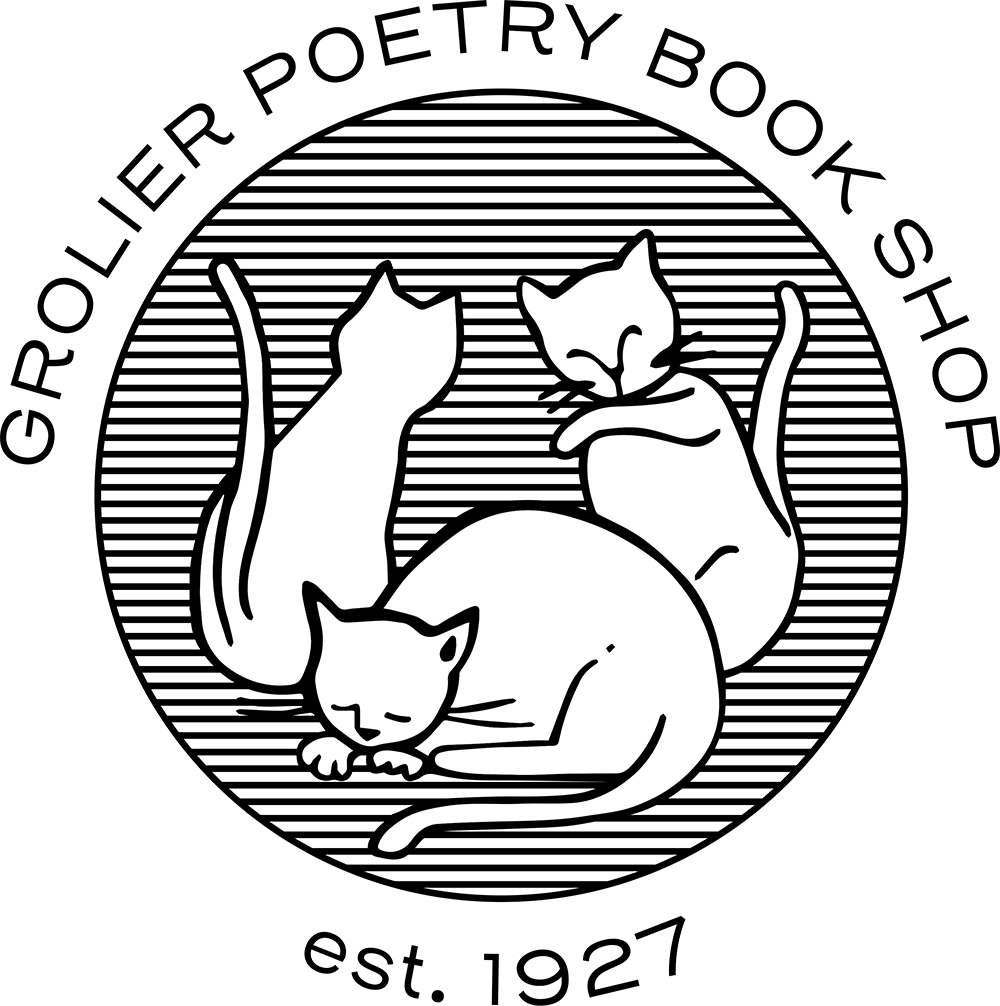 Image 1 of
Image 1 of

Through a Red Place by Rebecca Pelky
Rebecca Pelky’s story-in-poems assembles the author’s research into her Native and non-Native heritage in the land now known as Wisconsin. Through the poet’s ancestors—and documented through text and image—this book relates narratives of people who converged on and impacted this space in myriad ways. Written in English and Mohegan, Through a Red Place reshapes itself from page to page, asking what it means to navigate place as both colonizer and colonized. These poems seek the interior and exterior lives of beloved people and places, interacting with archives and visuals to illustrate that what is past continually interrupts and reinscribes itself upon the present. This collection embodies a refusal to go missing despite what’s buried, erased, or built over, much like the ancient mound now covered by an ammunition plant. An inventive collage of geography, history, myth, translation, lineage, erasure, journalism, and photography, Through a Red Place builds a map between distances and lost stories to unearth and honor the past.
Sonnet for the Mohegan Language
Without an adjective there is no blue
for bird or sky or water, which is not
to say a colorless world. See the hue
just there of a bird being red as it
builds a nest of twigs and bits of wire
(being gray or being rusty). There is room,
like Cricket laughing himself into fire,
for a bird to blacken sometime soon.
The nest as well, might find its niche
being small and happy while it waits
for eggs and then a family to stretch
the edge for love and size, to make it great.
The Mohegan world isn’t static, but flows
prismatic; each of us moves in rainbows.
Using maps, drawings, pedigree chart, photographs, news clippings, Indian school records, redacted source material from Andrew Jackson’s Message to Congress, and the wonderment of the English and Mohegan languages, Rebecca Pelky pieces together family history and the struggle for acknowledgment of heritage. ‘Here I am. / … I am certain. / I am genuine. / I am willing.’ And I would add, ‘I am writing.’ A competent, lyric/graphic claiming place.'
—Diane Glancy, author of The Book of Bearings
Rebecca Pelky’s search for her roots, distilled into these perceptive poems that dignify and respect their subjects, is vital to understanding America’s problematic history. Filled with photographs, maps, newspaper clippings, and other images, Through a Red Place has an appealing, scrapbook-like quality seemingly at odds with the haunting story it tells. Digging deeper into the book, however, reveals the true purpose of these artifacts: they serve as evidence, intensifying the message behind the poems.
—Erica Goss, Sticks & Stones
In Through A Red Place Rebecca Pelky maps a history of colonial dispossession on Turtle Island, tracing a family lineage and examining how settler-colonial violence causes alienation from land, language, and history. Archival photographs, family trees, and Google Maps images appear alongside these poems, positioning Pelky’s writing as an act of historical documentation that interrogates dominant settler-colonial narratives of Wisconsin’s past.
—Katherine DeCoste, Sundress Reads
Rebecca Pelky’s story-in-poems assembles the author’s research into her Native and non-Native heritage in the land now known as Wisconsin. Through the poet’s ancestors—and documented through text and image—this book relates narratives of people who converged on and impacted this space in myriad ways. Written in English and Mohegan, Through a Red Place reshapes itself from page to page, asking what it means to navigate place as both colonizer and colonized. These poems seek the interior and exterior lives of beloved people and places, interacting with archives and visuals to illustrate that what is past continually interrupts and reinscribes itself upon the present. This collection embodies a refusal to go missing despite what’s buried, erased, or built over, much like the ancient mound now covered by an ammunition plant. An inventive collage of geography, history, myth, translation, lineage, erasure, journalism, and photography, Through a Red Place builds a map between distances and lost stories to unearth and honor the past.
Sonnet for the Mohegan Language
Without an adjective there is no blue
for bird or sky or water, which is not
to say a colorless world. See the hue
just there of a bird being red as it
builds a nest of twigs and bits of wire
(being gray or being rusty). There is room,
like Cricket laughing himself into fire,
for a bird to blacken sometime soon.
The nest as well, might find its niche
being small and happy while it waits
for eggs and then a family to stretch
the edge for love and size, to make it great.
The Mohegan world isn’t static, but flows
prismatic; each of us moves in rainbows.
Using maps, drawings, pedigree chart, photographs, news clippings, Indian school records, redacted source material from Andrew Jackson’s Message to Congress, and the wonderment of the English and Mohegan languages, Rebecca Pelky pieces together family history and the struggle for acknowledgment of heritage. ‘Here I am. / … I am certain. / I am genuine. / I am willing.’ And I would add, ‘I am writing.’ A competent, lyric/graphic claiming place.'
—Diane Glancy, author of The Book of Bearings
Rebecca Pelky’s search for her roots, distilled into these perceptive poems that dignify and respect their subjects, is vital to understanding America’s problematic history. Filled with photographs, maps, newspaper clippings, and other images, Through a Red Place has an appealing, scrapbook-like quality seemingly at odds with the haunting story it tells. Digging deeper into the book, however, reveals the true purpose of these artifacts: they serve as evidence, intensifying the message behind the poems.
—Erica Goss, Sticks & Stones
In Through A Red Place Rebecca Pelky maps a history of colonial dispossession on Turtle Island, tracing a family lineage and examining how settler-colonial violence causes alienation from land, language, and history. Archival photographs, family trees, and Google Maps images appear alongside these poems, positioning Pelky’s writing as an act of historical documentation that interrogates dominant settler-colonial narratives of Wisconsin’s past.
—Katherine DeCoste, Sundress Reads
Rebecca Pelky’s story-in-poems assembles the author’s research into her Native and non-Native heritage in the land now known as Wisconsin. Through the poet’s ancestors—and documented through text and image—this book relates narratives of people who converged on and impacted this space in myriad ways. Written in English and Mohegan, Through a Red Place reshapes itself from page to page, asking what it means to navigate place as both colonizer and colonized. These poems seek the interior and exterior lives of beloved people and places, interacting with archives and visuals to illustrate that what is past continually interrupts and reinscribes itself upon the present. This collection embodies a refusal to go missing despite what’s buried, erased, or built over, much like the ancient mound now covered by an ammunition plant. An inventive collage of geography, history, myth, translation, lineage, erasure, journalism, and photography, Through a Red Place builds a map between distances and lost stories to unearth and honor the past.
Sonnet for the Mohegan Language
Without an adjective there is no blue
for bird or sky or water, which is not
to say a colorless world. See the hue
just there of a bird being red as it
builds a nest of twigs and bits of wire
(being gray or being rusty). There is room,
like Cricket laughing himself into fire,
for a bird to blacken sometime soon.
The nest as well, might find its niche
being small and happy while it waits
for eggs and then a family to stretch
the edge for love and size, to make it great.
The Mohegan world isn’t static, but flows
prismatic; each of us moves in rainbows.
Using maps, drawings, pedigree chart, photographs, news clippings, Indian school records, redacted source material from Andrew Jackson’s Message to Congress, and the wonderment of the English and Mohegan languages, Rebecca Pelky pieces together family history and the struggle for acknowledgment of heritage. ‘Here I am. / … I am certain. / I am genuine. / I am willing.’ And I would add, ‘I am writing.’ A competent, lyric/graphic claiming place.'
—Diane Glancy, author of The Book of Bearings
Rebecca Pelky’s search for her roots, distilled into these perceptive poems that dignify and respect their subjects, is vital to understanding America’s problematic history. Filled with photographs, maps, newspaper clippings, and other images, Through a Red Place has an appealing, scrapbook-like quality seemingly at odds with the haunting story it tells. Digging deeper into the book, however, reveals the true purpose of these artifacts: they serve as evidence, intensifying the message behind the poems.
—Erica Goss, Sticks & Stones
In Through A Red Place Rebecca Pelky maps a history of colonial dispossession on Turtle Island, tracing a family lineage and examining how settler-colonial violence causes alienation from land, language, and history. Archival photographs, family trees, and Google Maps images appear alongside these poems, positioning Pelky’s writing as an act of historical documentation that interrogates dominant settler-colonial narratives of Wisconsin’s past.
—Katherine DeCoste, Sundress Reads
